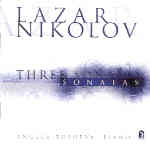This is a very difficult disc to write about, as it begs to be considered at least partly from a non-musical perspective. Bulgarian composer Lazar Nikolov apparently courted official disapproval during the Communist era for his avant-garde sympathies and uncompromising difficult musical style, and his artistic independence of thought deserves respect, as does his evident desire to avoid the clichés of both the Socialist Realist and Romantic Nationalist schools. But freedom from one sort of cliché doesn’t justify overindulgence in another: Nikolov’s music is awful. There’s very little if anything here to distinguish him from dozens, not to say hundreds, of mid-to-late 20th century purveyors of European atonal “squeak-bloop”.
Truth to tell, not all of this stuff sounds completely hideous. The comparatively early (1951) Second Piano Sonata has three concise movements in which a moody central Adagietto contrasts nicely with music whose rhythmic focus might just barely have some basis in Bulgarian folk music. It sort of sounds like colorless late Ginastera, if you can imagine such a thing. And the Seventh Sonata contains a central episode marked “Giocoso” which, if I’ve spotted it correctly, seems to be making an effort to achieve that particular form of expression. Still, it’s all so tediously unmemorable. Aside from that single episode, the Seventh Sonata lasts more than 24 interminable minutes, and the Sixth Sonata (in two oddly balanced movements–a brief allegro followed by another allegro that yields to a final largo) occupies nearly 20, practically all of it gray and featureless.
It wouldn’t be fair to lay the blame for this impression at the feet of pianist Angela Tosheva, who plays with considerable panache and no mean level of virtuosity and commitment. But in the end it’s a lost cause. This is music that illustrates the victory of technique over expression, of musical ideology over audible logic and meaning. And any ideology, whether political or artistic, when taken to extremes produces nonsense. Nikolov’s work may entitle him to well-earned respect in his native land for any number of reasons, but its value to record collectors and home listeners will, I strongly suspect, be minimal.
































